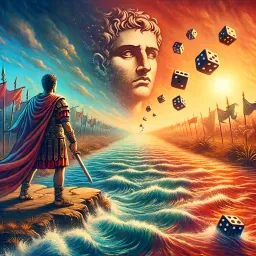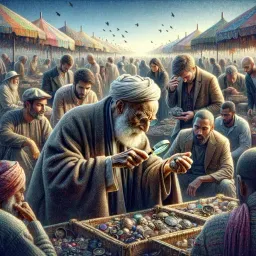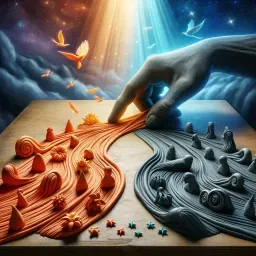”It is not in the stars to hold
our destiny but in ourselves“

0
0
0
0
- Meaning
- "It is not in the stars to hold our destiny but in ourselves" is a profound reflection on personal agency and responsibility. Despite the ancient belief in astrology and fate, Shakespeare here gives voice to a more modern perspective that emphasizes human control over one's path and decisions. The quote argues that one's future is determined not by external cosmic forces or predetermined destiny but by one's actions, choices, and inherent characteristics.
- Allegory
- In the designed image, the person with the compass and star chart symbolizes the blending of celestial guidance and personal choice. The paths represent various life choices, highlighting the theme of individual agency in determining one’s destiny. The emphasis on the compass over the star chart visually portrays the quote's message that our own choices, more than fate or external forces (represented by the stars), shape our future. This allegorical representation underlines the power and responsibility each person holds in deciding their path in life.
- Applicability
- The message of this quote can empower individuals in personal growth and decision-making. It encourages taking responsibility for one’s actions and shaping one's destiny through deliberate choices and effort, rather than attributing one's circumstances to fate or external factors. This proactive attitude can be applied in various aspects of life, such as career, relationships, and personal goals, fostering a mindset that focuses on capability and empowerment.
- Impact
- The influence of this quote extends beyond its literary origin as it serves as a motivational touchstone for many who seek to affirm the value of personal responsibility and self-determination. Its appeal lies in empowering individuals to look inward for strength and direction rather than to external forces. This perspective is frequently echoed in motivational speeches, self-help materials, and modern psychological contexts.
- Historical Context
- The quote is from "Julius Caesar," a tragedy by William Shakespeare, written in 1599 during the Elizabethan era. This period was marked by a strong belief in supernatural phenomena like witchcraft and astrology. Shakespeare’s assertion emphasizes Renaissance humanism, where the focus shifted to human potential and achievements.
- Criticisms
- While generally celebrated, the idea presented in the quote can also face criticism, particularly from those who emphasize the role of systemic factors and external circumstances in shaping individuals' destinies. Critics might argue that attributing destiny entirely to personal control oversimplifies complex interactions between individual agency and societal constraints.
- Variations
- The quote is primarily interpreted through the lens of Western individualism where self-determination and personal responsibility are highly valued. In collectivist cultures, the interpretation might focus more on how individual choices impact the community and the interconnected fate shared among community members.
-

Alea iacta est
-

This above all: to thine own self be true, and it must follow, as the night the day, thou canst not then be false to any man.
-

Caveat emptor.
-

The fault, dear Brutus, is not in our stars, but in ourselves.
-

Vox populi, vox Dei.
-

Be not afraid of greatness. Some are born great, some achieve greatness, and others have greatness thrust upon them.
-

Suae quisque fortunae faber.
-

We know what we are, but not what we may be.
-

There is nothing either good or bad, but thinking makes it so.
-

I must be cruel, only to be kind.
-

The fool doth think he is wise, but the wise man knows himself to be a fool.
No Comments